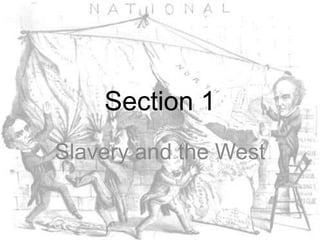
Road to civil war
- 1. Section 1 Slavery and the West
- 2. New Western Lands Competition over Land Northerners want to restrict slavery South saw this as interference Led to sectionalism – an exaggerated loyalty to a particular region of the country
- 3. Problem with Missouri 1819 – 11 slave states, 11 free states Admission of Slave State would upset balance
- 4. Missouri Compromise Admit Missouri as slave and Maine as free Prohibit Slavery in new lands north of 36° 30’ N Latitude Organized by Henry Clay
- 5. New Lands create more problems – expansion of slavery at the heart of the problem Leads to a new compromise Henry Clay rises to occasion again
- 6. Compromise of 1850 Admit California as free New Mexico Territory would have no restrictions on slavery NM – TX border settled in favor of NM Slave trade abolished in Washington D.C. Stronger fugitive (runaway) slave law
- 7. Fugitive Slave Act Required all citizens to help catch runaways Anyone who aided a fugitive could be penalized or imprisoned
- 8. Fugitive Slave Act Increased Resentment between North and South South wants North to respect rights Northern captures are seen as invasion
- 10. Anthony Burns Escaped slave captured in Boston Becomes “poster child” for fugitive slave dispute Pres. Pierce wanted to make an example of him Effect - Abolition movement grows in the North
- 11. Kansas and Nebraska South opposed - Likely to be free states because of location Stephen Douglas proposed abandoning Missouri Compromise and replacing it with popular sovereignty (letting the settlers in each territory vote on whether to allow slavery) North fears this will allow slavery to grow
- 12. Kansas/Nebraska Act Allowed state to determine issue of slavery Created a rush of settlers Pro-Slavery and Anti-Slavery groups rush supporters into territory Both sides create rival governments
- 13. Bleeding Kansas Both groups arm themselves Lawrence (Anti-Slavery capital) is attacked by Slavery supporters Retaliation leads to more violence
- 14. John Brown Abolitionist Angered by attack of Lawrence Wants to “strike fear in hearts of proslavery people” Led 4 of his sons and 2 other men to Kansas - kill 5 supporters of slavery
- 19. Violence spills into Congress Charles Sumner criticized pro-slavery forces in Kansas Preston Brooks nearly beat him to death on the Senate floor with a cane
- 21. Birth of the Republicans Kansas/Nebraska Problem created divisions Anti-Slavery Democrats and Whigs broke to join Free-Soilers Formed the Republican Party - determined to ban slavery in new territory
- 22. New Problem-Dred Scott Slave from Missouri - Owner moved him to Illinois and Wisconsin (where slavery was banned) - then moved back to Missouri where owner died Scott sued for freedom
- 23. Dred Scott Decision Supreme Court decided Scott was still a slave Went further - said slaves aren’t citizens but are property Therefore - No One can prohibit slavery (Constitution Protects It) Ends Missouri Compromise Ends Popular Sovereignty Republicans main issue ruled unconstitutional
- 24. Lincoln-Douglas Debates Stephen Douglas: Lawyer Democratic Senator Disliked Slavery, but didn’t want controversy to interfere with growth Believed in Popular Sovereignty
- 25. Lincoln-Douglas Debates Abraham Lincoln: Lawyer Former Whig, Joined Republicans Thought slavery was wrong, but didn’t think it could be eliminated Did not want slavery to spread
- 26. Lincoln-Douglas Debates Debated 8 Times Mainly debated about slavery Lincoln got Douglas to admit there would be ways for people to exclude slavery (lost him support in the South) Douglas won election - Lincoln gained a national reputation
- 28. Raid on Harper’s Ferry John Brown leads 18 black and white men to raid an arsenal Hoped to arm slaves and start rebellions in the South Winds up surrounded in Arsenal, arrested and sentenced to death
- 32. Dividing the Nation South discovers Harper’s Ferry raid was funded by Northern abolitionists - ignites fears Many northerners saw him as a martyr (someone who dies for a cause)
- 33. Election of 1860 4 Candidates Stephen Douglas (Dem.) - supported in North John C. Breckenridge (Dem.) - supported in South John Bell (Union) - supported by moderates in Border states Abraham Lincoln (Rep.) - supported by those that wanted to stop spread of slavery
- 34. Election of 1860 - Results Democrats divided 2 Races: Lincoln v. Douglas in North, Douglas v. Breckenridge in South Lincoln won majority of electoral votes (180) - More populous North outvoted the South
- 37. Secession South Carolina decides to withdraw from country 1st - justify with state’s rights (voluntarily chose to enter country, therefore they can choose to leave) Texas, Louisiana, Mississippi, Alabama, Florida and Georgia join Later, Arkansas, Tennessee, North Carolina and Virgina join
- 38. Why didn’t Lincoln let them leave? Believed in the idea of “Union” Thought our country was the “last best hope on Earth” If you let South go: democracy is a worldwide failure Democracy had just failed in Europe - 1848 revolutions
- 39. Ft. Sumter Confederates trying to retake forts owned by U.S. Lincoln wants to hold onto Ft. Sumter (in South Carolina) Fort runs low on supplies - Lincoln sends supplies Jefferson Davis orders attack 70 hours of bombs - surrender (1 dead) Start of the Civil War
- 40. Ft. Sumter Anderson Beauregard
